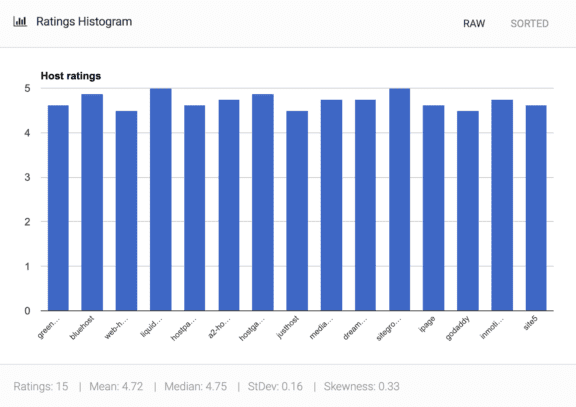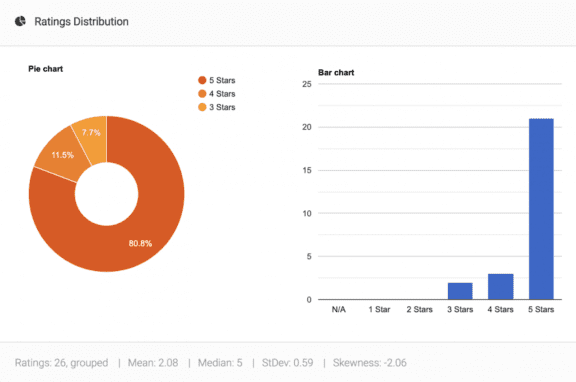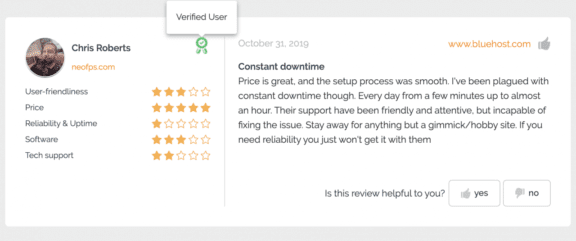When was the last time you checked online reviews before making a purchase or booking a service? Chances are, it was not too long ago. In today’s digital age, online reviews have become a powerful tool for consumers to assess the quality and reputation of businesses and products. According to a survey by BrightLocal, 91% of consumers read online reviews, and 84% trust them as much as personal recommendations. However, not all online reviews are created equal. With the rise of fake reviews, it has become increasingly challenging to distinguish between genuine feedback and fraudulent ones.
I understand that finding reliable hosting for your website can be a daunting task. And with so many options available, it can be very hard to determine which reviews are genuine and which ones are purely fake. In this article, I’ll try to provide you with comprehensive information on how to spot those fake hosting reviews and choose a truly reliable hosting provider.
Points of discussion in this post include:
- What Are Fake Hosting Reviews?
- Why Are There So Many Fake Reviews?
- How to Spot Fake Hosting Reviews?
- Watch Out For These Similarities Of Fake Review Sites:
- The 14 Types Of Fake Hosting Review Sites:
- 1. The “Claims” Review Site
- 2. The “Copy & Paste” Review Site
- 3. The “Generic Customers” Review Site
- 4. The “Top 10” Review Site
- 5. The “Hosting Directories” Review Site
- 6. The “One Review Only” Review Site
- 7. The “Keyword Target” Review Site
- 8. The “Awards Site” Review Site
- 9. The “Customer-Based” Review Site
- 10. The “Gimmick” Review Site
- 11. The “Freelance Writer” Review Site
- 12. The “Redirect” Review Site
- 13. The “I’ll Never Use Their Service Again” Review Site
- 14. The “Get Paid To Review Us” Review Site
- How Do You Know If A Review Site Can Be Trusted?
- Summary
- Further reading:
What Are Fake Hosting Reviews?
Fake hosting reviews are reviews that are written with the sole purpose of promoting a hosting provider or defaming a competitor. These reviews often contain biased opinions and false information. They can be published on various platforms, including social media, forums, and blogs. Unfortunately, these fake reviews can lead to false expectations and disappointment, fooling potential customers into choosing an inferior hosting plan.
Why Are There So Many Fake Reviews?
The primary reason there are so many fake reviews is that it’s actually a pretty lucrative business. A lot of web hosting sites will offer a fee (anywhere from $50-$200) for each referral that signs up for their web hosting.
Some of the most popular hosting affiliate programs:
- WPEngine Affiliate Program ($200 per sale)
- Bluehost Affiliate Program ($65-$120 per sale)
- Siteground Affiliate Program ($50-$125 per sale)
- Hostgator Affiliate Program ($50 per sale)
- A2 Hosting Affiliate Program ($85-$140 per sale)
- Hostinger Affiliate Program (60% commission per sale)
Because of the high payout, it’s almost impossible to find hosting without landing on some affiliate website. Their only goal is to receive compensation from the web hosts they are promoting and fake review sites will do that in any way they can.

Web hosting review sites can also skew their reviews and recommendations, favoring sites or recommending the sites with the highest payout. It’s because of this that a lot of reviews on these sites aren’t even from actual users. A review site might even be owned by the web hosting platform themselves, constantly favoring themselves as number one to get more users.

If there isn’t payment involved, web hosting sites might write numerous reviews to help boost their SEO. This might be particularly true for newer or smaller web hosting platforms that are looking to build their customers but can’t afford to pay out affiliates like the larger companies. These are carefully crafted reviews to concentrate on specific keywords to optimize search terms to dominate search engines. New web hosting companies might also create a lot of fake reviews, in the beginning, to help build interest and trust.
Affiliate sites might use both of these strategies using cookies. If you visit a review that used SEO to capture your attention and the site has cookies to populate on your computer, even if you don’t click through with them, they still get paid as an affiliate once you select your web hosting (although this can be counter-productive because if Google or other search engines find them doing this, they can lose their search engine rankings).
It’s also worth noting here to be wary of web hosting sites that give awards. Often they give out awards to the companies with the highest affiliate payouts.
How to Spot Fake Hosting Reviews?
Fake hosting reviews can be challenging to spot, but there are several red flags to look out for. One of the most common signs of a fake review is a lack of detail. If a review is short and doesn’t provide any specific information about the hosting provider, it may be fake. Another sign is a large number of positive reviews that are all posted within a short period. This could indicate that the hosting provider is artificially inflating its reviews.
This is pretty much how you spot fake hosting reviews:
- Look for detailed reviews: Genuine reviews often provide detailed information about the hosting provider’s features, performance, and customer support.
- Check the review date: Fake reviews often appear in large numbers within a short period. Look for reviews that are posted over a more extended period.
- Check the reviewer’s profile: Genuine reviewers often have a history of reviewing various products and services. Fake reviewers often have only one or two reviews.
- Check for inconsistencies: Fake reviews may contain inconsistencies, such as conflicting information or overly positive language.
- Check multiple sources: Check multiple sources to get a broader perspective on the hosting provider’s reputation.
Watch Out For These Similarities Of Fake Review Sites:
- Lack of Data: If there isn’t any hard data backing up their claims or any specific details about how web hosting is performing.
- Copied Information: A review that just copies and pastes the web hosting sites’ specs. If a review sounds like an advertisement, it probably is.
- Too Positive: If the review is way too glowing and over the top. It also might be to counteract bad reviews.
- Anonymous or No Information: If there is no validation that a reviewer is a real person.
- Too Negative: If all a reviewer is doing is bashing on a competitor instead of reviewing the actual product at hand.
- Not Hosted Themselves: If a review mentions the site they are hosted on and you run a check to see it’s not.
- No Traffic: If the site traffic is less than the number of reviews.
The 14 Types Of Fake Hosting Review Sites:
1. The “Claims” Review Site
This is often an easy one to write for anyone trying to hook you into signing up with a web host. They don’t include any hard facts or verifiable data. It’s just open-ended statements that make claims. In other words, if it sounds like a used car ad with statements along the lines of, “We will outperform our competition” or “Everyone who signs up with us is a satisfied customer” it is a fake site. Pretty bland, right? Nothing really solid here makes this a fake review.
2. The “Copy & Paste” Review Site
As if the first one wasn’t easy enough to do, any web host review site that contains the exact, word-for-word content of the actual web host website should be a giveaway. Sure, when you copy and paste you eliminate the risk of getting something wrong by using the exact content of the web host. Where this fails is that anyone can copy and paste data from any equipment site and pass it off as an authoritative source online. Don’t be fooled by this one.
3. The “Generic Customers” Review Site
There are many ways to spot this phony web host reviews site through customer information. Sure, it may list a number of truly awesome, well-written reviews from happy customers. However, check for these details. Does the customer review indicate that it is from a ‘verified purchaser?’ Does the customer review include a domain or IP address for verification? These are two red flags that should be waving frantically in your face at these fake sites.
4. The “Top 10” Review Site
C’mon, we really aren’t that stupid, are we? Anytime you encounter a web host review site that features their Top 10 Best Web hosts For Features or whatever criteria are being used this week, you know you have a phony site. In fact, if the Top 10 does not include any real details that can be compared from one selection to another you are sure to be staring at a fake site on your computer screen. Again, an easy one to put together with little in the way of facts.
5. The “Hosting Directories” Review Site
This may look like a handy way to learn about different web host sites on a directory listing but beware. It’s one of many gimmicks used to appear as if the data is from a legitimate source. One serious clue to let you know when you have a fake site is if the directory only lists a few web hosting companies. For a directory of this kind to have any impact it should feature thousands of different web hosts. A difficult task for a fake site to handle.
6. The “One Review Only” Review Site
You may think you’ve hit the mother lode when you come across a web host review site that features just one company. It can come in the format of a single-page website or a website of a handful of pages that sing the praises of Webhost A and only Webhost A. It may even come across a little bit like the whole she-bang was sponsored by Webhost A and only Webhost A. That won’t be the case, but it will be another fake review site.
7. The “Keyword Target” Review Site
These are painfully easy to spot in the sea of garbage websites if your English skills are relatively good. You will be able to identify them by reading any paragraph and noting that the grammar does quite flow but for some reason, Web host A is mentioned a lot in conjunction with other words and phrases related to web hosting. Any time you see keywords that stick out like a sore thumb, you know you have a poorly built website designed as a fake site.
8. The “Awards Site” Review Site
Sure, if you won an award for something spectacular about your product you’d want to brag about it a little bit online, wouldn’t you? The problem with award site web host review sites is that some of the awards are made up, dubious and about as phony as the web host review site is. The only real ‘award’ that should be noted when searching for web host review sites is the position they come up within your search engine results.
9. The “Customer-Based” Review Site
Have you ever stumbled upon what looked like a pretty slick website featuring web host reviews only to discover it’s actually someone’s personal blog site? This is a dead giveaway when trying to weed through the fake and the real review sites out there. It may look legitimate but if you look closer and see other posts on random topics about the weather, the price of food and bitcoins chances are this is some guy with a fake review site.
10. The “Gimmick” Review Site
You have to admit that the only reason why gimmicks keep cycling around and around is that they all have a certain level of success. With the Internet, scammers are getting much better at playing the game so they are able to create some fresh spins on the old standby gimmicks. A gimmick is essentially a form of bait designed to get you to respond or act on something you read or see on the webpage. There’s a sucker born every minute, don’t be one of them.
11. The “Freelance Writer” Review Site
This is not always an easy one to identify. Essentially the website owner has contracted the task of writing reviews about the web hosts to an independent freelance writer. The probability that the writer has enough knowledge to produce passable content is negligible at best. To the untrained eye, a site like this may pass undetected. However, for someone with extensive knowledge on the topic will be able to spot the fake immediately.
12. The “Redirect” Review Site
Have you ever paid attention to the addresses that flash and flicker in the address bar at the top of the page on your computer screen? Not all URLs are legitimate. You can spot a redirect fake review site when you punch in the Internet address and as the page loads it passes on to one or more different website URLs before finally loading properly. It’s a trick used by many but if you know what to watch for you’ll be able to see the fake activity instantly.
13. The “I’ll Never Use Their Service Again” Review Site
Have you ever noticed that there are very, very few (if any) web host review sites that point to the negatives of a single brand in an attempt at ‘outing’ them? Sure, there are some less than favorable reviews posted online by ‘verified purchaser’ type sites where some web hosts get kicked around a little but there is no real resource on bad web hosts. Should you ever find one listing the “Top 10 Worst Web hosts Online” it probably isn’t a fake review site.
14. The “Get Paid To Review Us” Review Site
Remember what we said earlier about gimmicks? This is probably one of the most common ones out there. Maybe paying you for a good review is the only way this service can get good reviews. That should tell you something about that particular company or service. There’s nothing wrong with offering customers an incentive of some kind but to flat out feed a bribe to get a good review means the product is either bad or does not do what it is claimed to do.
How Do You Know If A Review Site Can Be Trusted?

Now that you have an idea of how to spot and identify the most obvious offenders of the fake review site rules, you will be able to search the Internet knowing one thing. That not everything you find online is true or endorsed by the company or product being reviewed.
The only way to be 100% certain that a review can be trusted is if it is hosted on a site that doesn’t make money from an affiliation, nor does the reviewer. Unfortunately, it’s hard to find. Here are a couple of ways to check if you can trust a review:
- Balance: The review site has a balance of both positive and negative reviews.
- Research: Don’t trust one site or review. Search around and look at reviews on multiple sites.
- Trust Your Gut: When it all looks too good to be true, it probably is.
If you come across one of these fake review sites, there is not much you can do other than not click on any of the links contained in the site. That’s how the fakers make their money, by sending you to the web hosts through an affiliate link.
If enough people quit falling for the phonies, they would eventually disappear over time. I hope.
Summary
In conclusion, finding a trustworthy hosting provider can be a challenging task. However, by following the tips in this article, you can avoid fake reviews and find the best hosting provider for your website. Remember to look for unbiased reviews, identify fake reviews, and consider the factors that are important to you when choosing a provider. With these tips in mind, you can make an informed decision and find a reliable hosting provider that meets your needs.
To find trustworthy hosting reviews, you should look for websites that are not affiliated with hosting providers and do not receive commissions for referrals. These websites are more likely to provide unbiased and truthful reviews. You can also look for reviews that provide specific details about the hosting provider’s features, performance, and customer support. It’s also a good idea to read reviews from multiple sources to get a balanced view.
Let’s discuss it further in the comment section below. Share which fake hosting review sites do you know.
Further reading:
- Fake Web Hosting Reviews. How to Recognize Them
- A Guide to Fake Hosting Reviews
- Hosting Reviews vs. “Hosting Reviews”
- Hosting Review Websites – Are They Fake?
- Dirty, Slimy, Shady Secrets of the Web Hosting Review (Under)World
- How to Spot a Fake Review Website: WikiHow.com
- How To Manage Fake Reviews On Google, Facebook, And Glassdoor
- How to Differ Real & Fake Reviews
- Is That Online Review Site Telling You the Truth?
- Honest Reviews By Affiliates – How Much Can We Trust?
- Tired of All The Fake Reviews
- Fake Web Hosting Reviews Suck. Spotting Affiliate Links
- How to Spot & Avoid Bad Web Hosting Companies
- Web Hosting: It’s a Giant Scam!





Thanks for sharing useful information about Fake Reviews.
Sometimes, victory or defeat doesn’t depend on the end result. The winner is the one who knows to let go at the right time, so late to accept only defeat.
The blog has very nice information and amazing facts to read. Thanks for sharing this post! You can also check our blog
Just wanted to let you know we linked to you, And ask if a link back might be possible? We all know the more inbound and outbound links, the more Google like us, Thanks https://rshweb.com/blog-compare-hosting-services
As a webmaster, I believe with all the above points, one should be exposed enough to be able to make out the difference between a fake and real hosting review site. Seriously, these fake sites have done more harm than good.
The most annoying thing about these fake review sites is that they now know that people are getting wiser and can smell them out. So they are improving and making their sites look very convincing. It really pains me that almost nothing can be done to bring them all down.
Honestly, there are thousands of fake recipes hosting review sites that one has to struggle to fish them out and not fall for them. It takes luck and smartness to identify them. Now they are already working hard to remove all traces of fake and webmasters are falling madly into their traps.
Gosh. You just talked about something that is becoming a bother in my mind. The first time I tried getting a web host for my site, I fell into the hands of these people and I almost lost it. I wish these people would just disappear from the face of the internet and stop deceiving unsuspecting people.
Nice post. I learn something totally new and challenging on websites I stumbleupon everyday. It’s always useful to read through articles from other authors and practice something from their sites.